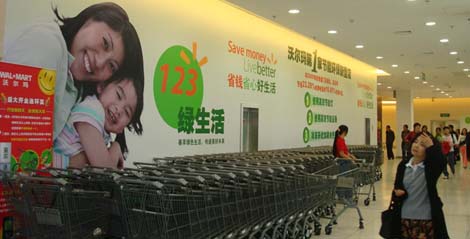Foreign
Walmart displays its 'green' promises in farm programs
By Yu Tianyu (China Daily)
Updated: 2010-05-10 11:37
 |
Large Medium Small |
|
 |
|
Nearly 100 trolleys stand ready for customers at a Beijing Walmart store. [China Daily] |
BEIJING: There are no concessions for the US-based retail giant Wal-Mart Stores Inc (branded as Walmart) when it comes to "eco-friendly", "sustainable" and "low carbon dioxide".
|
||||
Walmart has previously said that compared with a typical store in 2005, its new outlets are expected to consume 23 percent less electricity and 17 percent less water annually.
Ed Chan, president and chief executive officer of Walmart China, said: "All new Walmart outlets are environmentally-friendly stores. Such outlets are able to reduce electricity consumption by 35 percent and water consumption by 68 percent compared with the traditional ones."
|
 |
|
Ed Chan, president and chief executive officer of Walmart China, said the retailer has implemented concepts of environmentally-friendly and energy saving into all aspects of its retail business. |
At the same time, the company's existing stores will also be fitted with more sustainable equipment.
Chan said that Walmart has implemented concepts of environmentally-friendly and energy saving into all aspects of its retail business.
He regards the Direct Farm Program under which Wal-Mart China cooperates with the Ministry of Commerce and the Ministry of Agriculture to directly purchase agricultural products from farmers nationwide, as one of the most significant parts of Walmart's green efforts in China.
"Simply speaking, the program is aimed at training farmers with scientific technologies in a bid to help them plant agricultural products with less water and less environmental impact while at the same time increasing their productivity and incomes," Chan said.
Over the past several years the company has set up 28 direct purchasing bases in 14 municipalities, provinces and autonomous regions that cover a total area of 300,000 mu (20,000 hectares).
"This initiative gives us a chance to bring our global experience in sustainable agriculture to China's supply chain, boosting scientific farming, environmental protection and strengthening the monitoring of food safety, which eventually delivers our Chinese customers quality products at a low price," Chan said.
Chan said: "It has been proved that the sustainable model is effective in reducing costs and improving sales and it is also able to greatly boost the retailer's competitiveness, especially when the economic outlook is gloomy.
"For example, we're working closely with a provider of washing powder to implement energy saving and environmentally-friendly notions. After the quality of washing powder has been improved it will be able to wash more using less water, and less packaging leads to lower transport costs and also lower prices."












